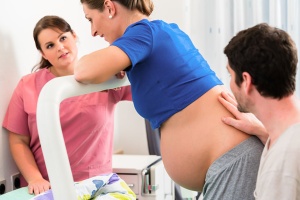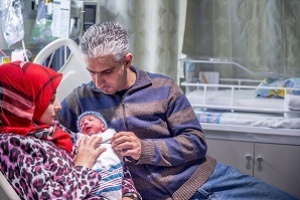It’s often one of the top concerns of mums who already have children. Read our checklist to help organise childcare for when you're in labour.
It’s wonderful to have your partner, close friend or family member with you when you’re in labour. Yet it can often mean there’s no one readily available to look after any other children you might have.
It would be unusual to have them in hospital with you while you’re giving birth (Naber, 2017). Though if you feel strongly about it you can ask your hospital what their guidelines are. Usually, someone else looks after older children while you and your partner are at the hospital.
Of course, this raises the question of who the best person is to look after your other children while you’re in labour. They need to be someone who can get to you at short notice, and ideally someone who your child is very familiar with.
Choose someone close
If you’re lucky enough to have family and close friends nearby, they are the ideal solution. But it’s always a good idea to have a back-up plan in case they can’t get to you when labour starts.
You’ll also need to think through the practicalities of them looking after your children, such as if they’ll look after them at their home or yours. If you go into labour at night, will they be able to carry on looking after your children in the morning? Having another commitment like work might mean you need to find someone else who can take over from them.
If you don’t have family or friends available, you could ask a trusted babysitter or childminder, or perhaps a friend from your NCT group. Alternatively, a neighbour or parents at your children’s nursery or school could help. You might be surprised at how willing people are to step in if you ask.
"As with family and friends though, it’s always good to have a plan B (or even C) if you can’t get hold of them, or they can’t get to you quickly enough when you go into labour."
Put your child at ease
Whoever you choose, arrange for them to spend time with your older child or children well in advance of your due date. Invite them over so they can see how you put your child down for a nap. You could also show them firsthand how you do meals and bedtimes, so they are familiar with your baby’s routines and your child feels comfortable with them.
If your child will be staying at the carer’s home, try to visit several times before your due date. Explain that this is who will look after them when the new baby comes. You could even make it sound like an exciting adventure.
If your child doesn’t know them well already, they could read stories or play a game together to establish a connection.
Keep talking to your child about what’s going to happen so they’re familiar with the plan. Reassure them that although no one knows when you’ll have their new brother or sister, when the time comes they’ll be well looked after.
If you will be having a planned caesarean or having your baby induced, allow plenty of time for your child or children to settle in with their carer before you leave for the hospital.
Get everything ready
As well as preparing your child emotionally to spend time with a carer while you’re having your baby, make sure the practical side is covered too. For example, check that whoever is looking after your child has a suitable car seat if they will be driving them anywhere. If you have a planned birth, you could fit your child’s car seat into the carer’s car.
Also, have a bag ready with your child or children’s clothes, some favourite toys or comforter. Don’t forget other necessities, such as bottles or overnight bedding if needed.
Visiting their new sibling
Before the birth, check with the hospital what the rules are about visiting. This way you’ll know whether your child can visit while you’re in labour and when they can see you after the birth (NHS, 2016).
Hospitals can feel overwhelming for small children, especially if you or your new baby are attached to medical equipment. You can help prepare them by telling them what the hospital looks like and what they might see if they visit.
Try to explain things to your child but tell them that their new brother or sister will be coming home as soon as possible. You could give their carer the hospital route and parking details so they don’t have a stressful journey if they’re bringing them in.
To find services, contact details and information about booking a tour to find out more, check out the Which? And Birth Choices tool.
This page was last reviewed in September 2018.
Further information
Our support line offers practical and emotional support with feeding your baby and general enquiries for parents, members and volunteers: 0300 330 0700.
We also offer antenatal courses which are a great way to find out more about birth, labour and life with a new baby.
Make friends with other parents-to-be and new parents in your local area for support and friendship by seeing whatNCT activities are happening nearby.
Which? BirthChoiceUK provides information aimed at helping parents make the right choice about where to give birth.
NHS (2016) Visiting someone in hospital. Available at: https://www.nhs.uk/using-the-nhs/nhs-services/hospitals/visiting-someone-in-hospital/ [Accessed 29th October 2018].
Naber, N (2017) What do we know about sibling attended birth? Dunedin, New Zealand: Otago Polytechnic. Available at: http://opres.op.ac.nz/bitstream/handle/11604/62/MID%20-%20Naber%202017%… [Accessed 29th October 2018].








